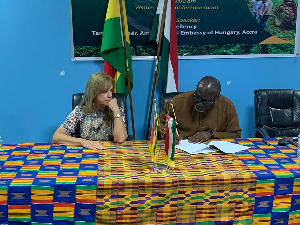 The collaboration aims to enhance the technical capacity of Agricultural Extension Officers
The collaboration aims to enhance the technical capacity of Agricultural Extension Officers
In a bid to boost food security and promote sustainable farming practices in Ghana, the Biotechnology and Nuclear Agriculture Research Institute (BNARI) of the Ghana Atomic Energy Commission (GAEC) has signed a Memorandum of Understanding (MoU) with Hungary’s Ministry of Agriculture.
The agreement, signed on April 10, 2025 at the School of Nuclear and Allied Sciences Conference Hall in Accra, will see the rollout of a training programme for Agricultural Extension Officers (AEOs) from April to September 2025.
The initiative begins with a five-week pilot phase, laying the foundation for broader nationwide implementation.
The collaboration aims to enhance the technical capacity of AEOs, equipping them with essential knowledge and practical skills to support farmers, improve agricultural productivity, and promote environmentally sustainable practices across Ghana.
Director of BNARI, Professor Michael Osae, and Ms Gabriella Grüner, FAO Project Coordinator at Hungary’s Ministry of Agriculture, signed the agreement on behalf of their respective institutions.
Describing the partnership as a significant milestone, Prof Osae said the initiative would play a crucial role in transforming Ghana’s agricultural extension services.
“This partnership marks the beginning of a vital learning journey aimed at strengthening the capacities of our Agricultural Extension Officers who are key to the transformation of Ghana’s agricultural sector,” he stated.
Prof Osae stressed the importance of extension officers as vital links between research institutions, policymakers, and farmers, ensuring the effective dissemination and adoption of new technologies and best practices at the grassroots level.
“Their responsibilities go beyond providing advice. They empower farmers with the skills and knowledge to increase productivity, enhance food safety, adapt to climate change, and improve livelihoods,” he added.
The training will cover critical areas such as extension methodology, agricultural knowledge and information systems, business planning, cooperative models for small-scale farmers, and postharvest management techniques.
Ms Grüner expressed her enthusiasm for the collaboration and its long-term benefits for Ghana’s agricultural sector.
“We are proud to collaborate with Ghana through BNARI to share Hungary’s expertise in agricultural innovation. Strengthening extension services is crucial to building resilient food systems, and we are confident that this programme will have a lasting impact,” she said.
Drawing from Hungary’s experience in Uganda, where a similar model led to significant improvements in agricultural outcomes, Ms Grüner reiterated Hungary’s commitment to knowledge-sharing and sustainable development.
She also highlighted Ghana’s inclusion among 48 countries benefiting from Hungary’s scholarship programme, noting that over 400 Ghanaian citizens have already participated.
The ceremony was attended by officials from GAEC, the Hungarian Embassy in Accra, Ghana’s Ministry of Food and Agriculture, and other key stakeholders in agriculture and scientific research.
MA
Watch the latest edition of BizTech below:
Click here to follow the GhanaWeb Business WhatsApp channel
